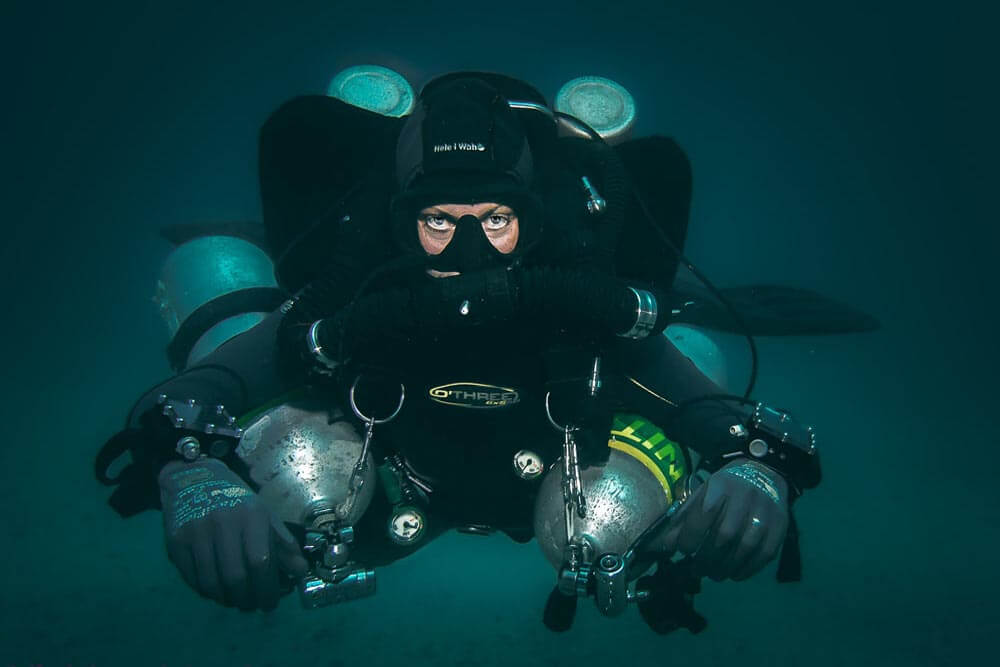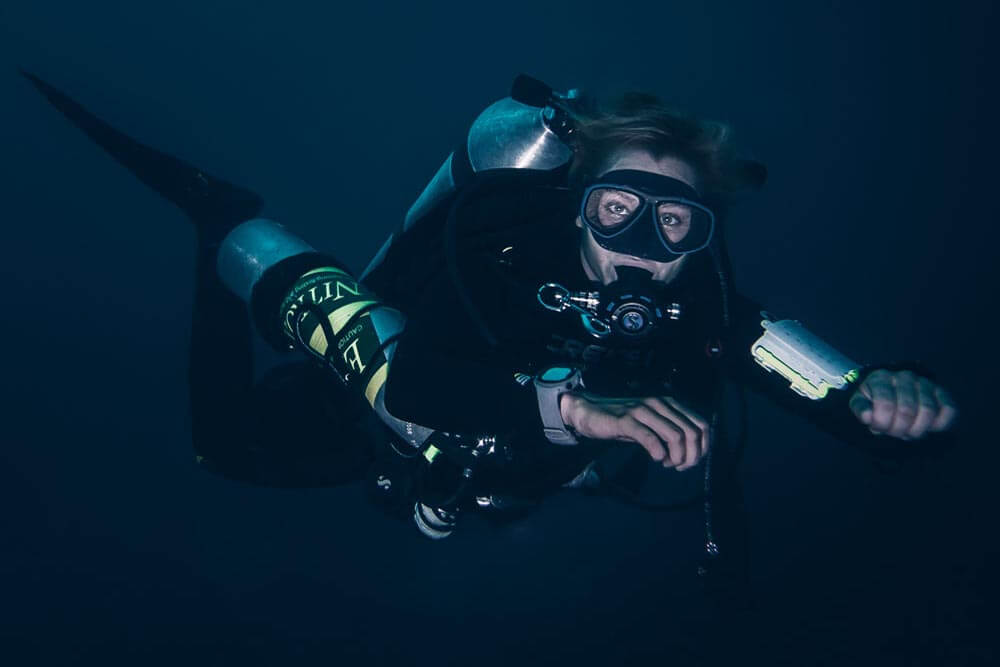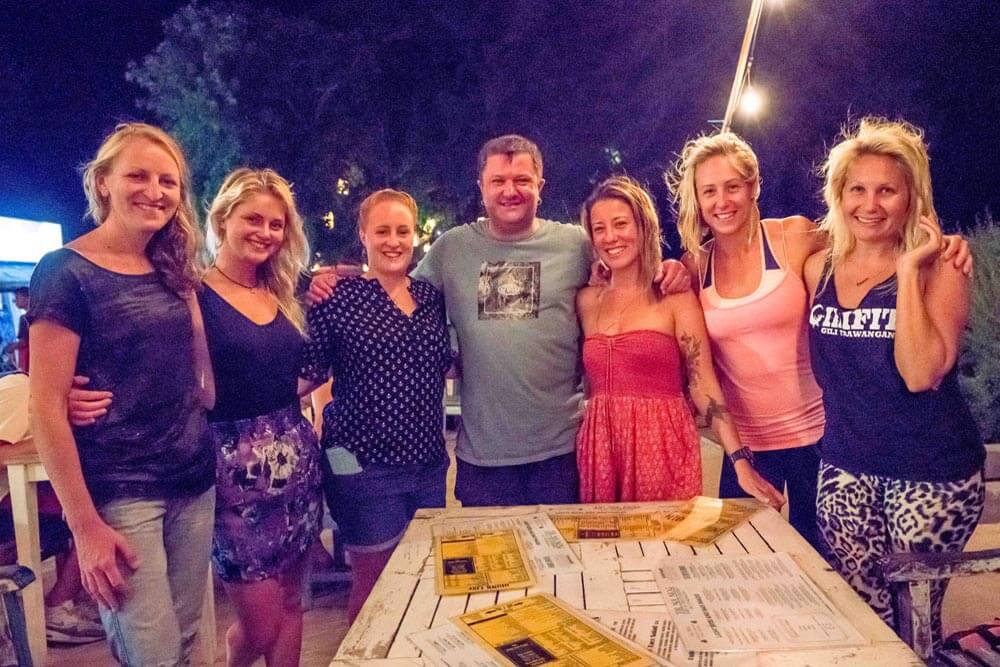
Words by Mark 'Crowley' Russell, photography by Alfie Minnaar
The technical diving scene on Gili Trawangan is young, strong, and divided almost equally between men and women. At the forefront of the female technical community – hashtag GirlsThatTechDive – is Theresia Gollner, an Austrian instructor recently awarded TDI’s accolade for the highest number of certifications in Asia by legendary technical diving pioneer Richie Kohler, at ADEX 2018.
Theresia, along with Australians Josie Tognolini, Leesa Scanlon and Eliza Bowden; Sarah Ashton from the UK and Laura ‘Kazi’ Kazimierska from Poland, kindly agreed to join me for a discussion of how they came to technical diving, why Gili Trawangan is the perfect place to get involved, and what it means to be a part of the female tech diving community.
The passion that the women have for technical diving was clear from the moment we began talking. Josie opened the Q&A session with a sentiment widely shared around the table. ‘Right from the word go, I wanted to not just be a recreational diver,’ said Josie, who was inspired by her mentor – a technical diver – during her divemaster training on Koh Tao. ‘I love the knowledge; knowing more about what’s happening, and being a better diver,’ she added. ‘Not just following a computer, but making a plan and executing it and knowing you’ve done a good job.’

Leesa and Sarah had come to Gili Trawangan initially to take recreational instructor courses at Blue Marlin Dive, but, said Leesa: ‘I was surrounded by the likes of Will Goodman (holder of the world depth record for rebreathers) and Theresia (Blue Marlin Dive Tec) at the time. So it was always going to happen.’
Sarah also took inspiration from Theresia’s presence as a female tech instructor. ‘I think a lot of it comes down to her being here,’ she said. ‘If it had been just guys doing it, I don’t know that I would have been so inclined to start.’
Theresia’s route into technical diving came about as a result of a ‘horrible’ dive on a wreck in Thailand, finding she ‘couldn’t control anything’ during a dive that she ‘absolutely hated’. Theresia’s instructor suggested she take an Advanced Open Water Course with him and ‘I will make you a better diver,’ he said. ‘He was a tech instructor,’ said Theresia, ‘and he was like a machine in the water! I said I want to dive like him, or I don’t dive at all.’
Kazi and Eliza began tech diving after already having worked for several years as recreational instructors. ‘I needed an extra challenge,’ said Kazi. ‘If you’re working as an instructor always teaching, then you want to keep the passion going.’ Eliza agrees: ‘I worked in Central America for three years,’ she said. ‘I’d done a lot of recreational everything, from DSDs to staffing IDCS,’ she added, ‘and I was very burned out on that.’
After arriving on Gili T, it only took a short conversation before Eliza had signed up for technical training.

Not all of the women want to break into the teaching of technical diving. For some, it is a chance to take some time away from the rigours of everyday life as a recreational dive instructor. ‘You love diving but it’s still a job and then it isn’t really about ‘you’ any more,’ said Leesa. ‘That extra tech diving hobby,’ she adds, ‘that’s just for me.’
Technical training for recreational instructors is a common theme within the community, and all the girls are united in the opinion that tech not only makes you a better diver, but also a better instructor. There is no ‘thrill’ associated with deep diving; it’s all about preparation, careful planning and proper execution of tasks well done, with constant room for improvement. ‘There’s so much you can learn, even as a newbie tech diver,’ said Sarah. ‘If you have the knowledge that tech teaches you it just makes you a better instructor.’ Kazi agrees: ‘I think that every recreational instructor should be a tech diver,’ she said, ‘at least at the basic level for the extra knowledge.’
Whether it’s teaching or just enjoying tech as a hobby, Gili Trawangan itself is a large part of the reason that the women have come together on this little island. ‘We have perfect conditions for tech,’ said Theresia. ‘You don’t have raging currents on the walls, the water is warm, we have amazing visibility. The chamber in Lombok is important,’ she continues. ‘I am a very conservative person and super risk averse. If I knew the nearest chamber was 10 hours away I wouldn’t tech dive in the Gilis. We have the logistics, we have the helium which gets here easily, the oxygen is on the island.’

The logistical convenience of Gili Trawangan is only part of the story. The community which thrives on the island is closely knit, something that could no better be exemplified than the way it rallied around Lombok and the surrounding islands after the devastating earthquake in August this year.
A good sense of that community was also recounted during the conversation when the girls related some (undoubtedly paraphrased!) comments from tech diving stalwart Edd Stockdale, shortly before he gave a presentation at ADEX 2018. Stockdale jokingly accused the group of techies from Gili T of ‘ruining his presentation’.
‘You’re sitting there all young and happy and smiling,’ he had said, ‘and my presentation is about how tech divers are all old and not working together. What you do is so unique on this island, with the community you have and how you support each other in tech, and this doesn’t happen everywhere in the world.’
Josie also recounts how, although she had been bitten by the tech-diving bug in Thailand, it was her arrival on Gili T that sealed the deal. While visiting the various dive centres on the island, the staff at each one invited her to a shark conservation presentation that was taking place that evening. ‘I thought it was a bit strange, everybody wanted to go to the same shop,’ she said. ‘I’d spent most of my time in places where every shop is always about themselves and I always wondered: why is it we are all so segregated when we all do the same thing?’

It’s a sentiment I share – I call it ‘competition through co-operation’. In an industry where margins are slim and customers are always on the lookout for the best price, inter-centre support is healthy for business as a whole, rather than the cut-throat approach present in some locations. That community spirit is one of the reasons I found the entire island of Gili T so appealing during my visit, especially from my perspective as a former dive professional.
Throughout my career, I’ve never encountered any particular gender discrimination among divers. I have been told that this is not always the case, but in the places I’ve worked it was very much a non-issue. Male or female, young or old, the customers were either divers or non-divers, and that was it. The recreational world is still majority male, but the gender gap is dwindling and it is an activity that is, by and large, welcoming to all. The gender gap in the technical arena remains much wider, however, and I wanted to know if any of the girls had encountered any overt sexism during their training, a question which was met a resounding chorus of ‘No!’ from around the table – and certainly not on Gili T.
There were some issues. Theresia said some male visitors would be hesitant about having her as a guide, addressing Will, with whom she works, rather than her directly. Her knowledge and capability would, however, dismiss the man’s ‘concerns’ rather rapidly. Eliza mentioned that not being able to carry her own gear (neither could I, during my technical try-dive earlier in the day) caused her to feel ‘a bit isolated’ at first until Gili T’s female tech community gave her the encouragement she needed to get started.

An older version of the TDI training materials apparently referred to tech divers exclusively through the use of male pronouns: ‘I was reading the book and it was all: on his dive, and he will do this, and on his course’, said Eliza. ‘I kept joking: ‘am I even meant to be on this course!?’’ The manual has long since been updated, but I very much enjoyed the way the women treated this lack of consideration as a source of mirth, rather than offence.
In an activity that remains majority male, Gili T’s ‘girls that tech dive’ have taken to technical diving because they are passionate divers who want to explore new challenges, improve their skills and knowledge, and be better, safer divers and instructors – and not (pun absolutely intended), because they seek to boldly go where no ‘man’ has gone before. In doing so, they are at the forefront of dispelling the myth that technical diving remains the preserve of that male majority.
That, I think, is truly inspirational.
With grateful thanks to Theresia for arranging the meeting, and Josie, Sarah, Kazi, Leesa and Eliza for taking part, and for Manta Dive Gili Trawangan for hosting my visit. You can read more about the community spirit that makes Gili T such a wonderful place in the Autumn print edition of DIVE. Theresia Gollner works at Blue Marlin Dive Tech and you can find more of Alfie Minnaar’s outstanding photography at alfredminnaarphotography.com. If you’re a female diver looking to learn more about technical diving, you can join the discussion in the GirlsThatTechDive facebook group.


